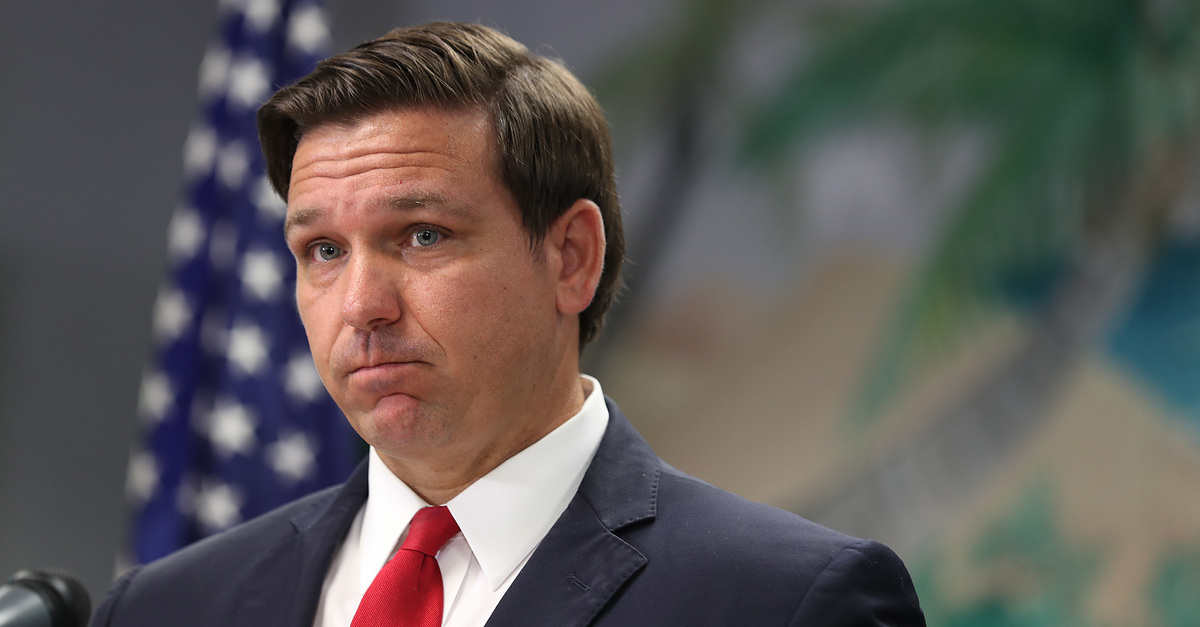
Despite his degree from Harvard Law School, Florida’s Republican Gov. Ron DeSantis’s latest fusillade against Silicon Valley has left legal observers wondering whether he has read the First Amendment of the U.S. Constitution. The pro-Trump Republican zealously advocated for a series of self-styled anti-censorship laws that three legal experts contacted by Law&Crime noted amount to unconstitutional compulsory speech for private companies—in direct contravention of U.S. Supreme Court precedent.
And DeSantis could have learned as much by reading a famous high court case involving his hometown paper.
In a last-minute press conference largely focused on denouncing “Big Tech” and “cancel culture,” DeSantis unveiled a proposal to penalize social media companies that suspend or block candidates for political office with hefty fines.
“We’ve seen the power of their censorship over individuals and organizations, including what I believe is clear viewpoint discrimination,’’ DeSantis said. “Under our proposal, if a technology company de-platforms a candidate for elected office in Florida during the election, a company will face a daily fine of $100,000 until the candidate’s access to the platform is restored again.”
DeSantis made his announcement on the same day that attorneys for Donald Trump formally argued that the former president’s false claims of election fraud and the role his words played in inciting his supporters to storm the U.S. Capitol were protected by the First Amendment.
The governor even specifically cited Twitter’s decision to permanently suspend Trump from its platform as a reason why his proposal was vital to upholding vital free speech principles.
https://www.youtube.com/watch?v=B6wfi8FaO-I&t=2s
But legal experts were quick to point out that DeSantis’s proposal was itself an unequivocal attack on constitutionally protected free speech.
“Governor DeSantis’ proposal is neither novel nor constitutional. It raises the same issue as a previous Florida law which required newspapers that criticized a political candidate to publish that candidate’s response,” First Amendment attorney Ari Cohn said in an email to Law&Crime.
That 1974 case, Miami Herald v. Tornillo, was cited by all three experts Law&Crime contacted.
“The Supreme Court struck down the law, ruling that it violated the newspapers’ First Amendment right to choose which content to run or not run,” Cohn said. “In invalidating that law, the Court expressly rejected the very same argument people make for regulating content moderation today: that concentration of ownership and ‘monopoly of the means of communication’ justifies forcing private parties to carry certain speech. But the Court found it unconstitutional then, and it remains unconstitutional now.”
Professor Daxton “Chip” Stewart, a media law expert who referred to the proposal as “hilariously unconstitutional,” said that DeSantis exhibited a fundamental misunderstanding of corporations’ rights.
“Basically, DeSantis seems to forget that private companies like Facebook and Twitter have First Amendment rights, too,” Stewart noted. “The government can’t force them to host speech they don’t want to, or threaten punishment like these absurd fines for refusing to give platforms to people they find intolerable. Just as a platform can remove accounts of terrorists or the KKK or a cabal that conspires to violently overthrow the government, they can remove accounts of any other individual.”
Stewart also noted that the Tornillo decision provided astute guidance on the matter.
“The [Tornillo] logic carries over to this kind of situation – platforms, as private companies, are allowed to make editorial decisions. The state of Florida could no more fine Facebook for refusing to host a racist or fascist politician than it could force a newspaper to publish an op-ed by that politician,” he wrote. “Sure, they may be shielded from liability for making those decisions under Section 230 of the Communications Decency Act, but that’s a different law for a different situation. It doesn’t alter the First Amendment at all. It seems that a lot of the time that these politicians complain about Section 230, what they really don’t like is that platforms have free speech protections just like regular citizens do. And you can’t undo that by repealing or changing Section 230.”
First Amendment attorney Marc J. Randazza lauded DeSantis’s overall objective, but said the proposed measure was not a viable means of achieving those ends.
“I respect what DeSantis is trying to do, but unconstitutional acts engaged in for a good reason do not transform them into constitutional acts,” he wrote, adding that the governor should start by “re-reading Miami Herald v. Tornillo.”
DeSantis did not immediately respond to an email requesting comment.
[image via Joe Raedle/Getty Images]